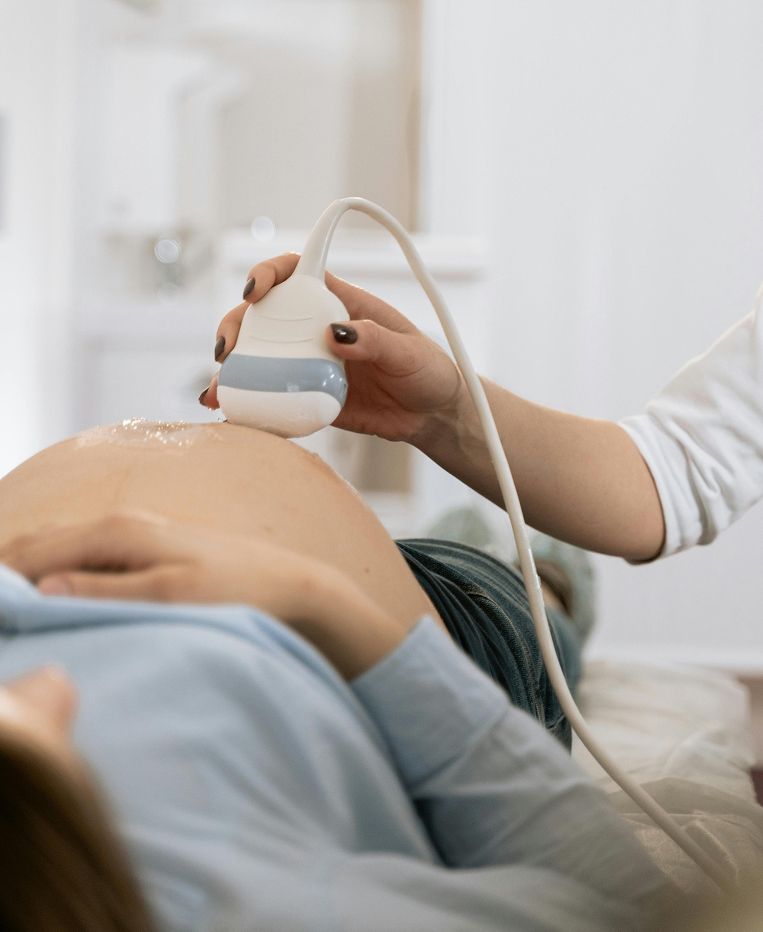In-Clinic Services
At Monash Obstetrics in Melbourne, we aim to make women’s healthcare as convenient, comprehensive, and comfortable as possible.
Our modern clinic provides a full range of in-clinic services to support diagnosis, treatment, and ongoing care across all stages of life – from adolescence through to pregnancy, menopause and beyond.
Having many services available onsite allows patients to access timely assessments and treatments without needing multiple external referrals. This continuity of care not only saves time but ensures every patient’s journey is seamless and fully supported by their own specialist.
Among our most valued services is onsite colposcopy, used to assess and manage abnormal cervical screening results. We also provide a range of additional diagnostic and procedural services, all delivered in a safe, private and professional environment.

Our In-Clinic Services
Monash Obstetrics offers a suite of in-clinic assessments and minor procedures, including:
- Colposcopy and cervical biopsy for abnormal cervical screening results
- Contraceptive device insertion and removal (Mirena®, Kyleena®, copper IUDs, Implanon®)
- Endometrial biopsy and sampling for abnormal bleeding
- Pelvic ultrasound for fertility, pregnancy, or gynaecological assessment
- Fertility investigations for both female and male partners
- Early pregnancy scans and reassurance checks
- Antenatal monitoring and non-stress testing
- Minor gynaecological procedures, such as polyp removal or cyst drainage
- Cervical screening (Pap smears) and HPV testing
These services are provided by our team of highly experienced obstetricians and gynaecologists, supported by advanced imaging and diagnostic technology.
Colposcopy
What Is a Colposcopy?
A colposcopy is a simple, in-clinic procedure that allows your doctor to examine the cervix, vagina and vulva under magnification using a specialised instrument called a colposcope. It is typically recommended when a cervical screening test (Pap test or HPV test) shows abnormal results, or if there are symptoms such as post-coital bleeding or visible cervical changes.
The procedure is performed while you lie comfortably on an examination couch, similar to a standard Pap test. A small speculum is inserted into the vagina, and the colposcope – which remains outside the body – is used to provide a magnified view of the cervix. A mild solution may be applied to highlight any abnormal cells.
If any areas appear unusual, a small tissue sample (biopsy) may be taken for further analysis. The entire procedure usually takes around 10–15 minutes and does not require anaesthesia.
When Is Colposcopy Recommended?
Your doctor may recommend colposcopy if:
Your cervical screening test shows abnormal or high-risk HPV results
Previous Pap tests have shown persistent abnormalities
There is unexplained vaginal bleeding, particularly after intercourse
There are visible lesions or changes on the cervix
You have been exposed to diethylstilboestrol (DES) in utero (rare)
In most cases, abnormal cervical changes are not cancer, but early detection through colposcopy allows any precancerous cells to be treated before they progress.
Risks and Recovery
Colposcopy is a very safe procedure. Mild discomfort, spotting, or light bleeding may occur for a day or two if a biopsy is taken. You can usually return to normal activities immediately, though it is recommended to avoid intercourse and tampons for 24–48 hours after a biopsy.
Results from any biopsies are generally available within one to two weeks, after which your specialist will discuss the findings and next steps.
Cervical Screening and HPV
Australia’s National Cervical Screening Program has significantly reduced cervical cancer rates – now among the lowest in the world. Cervical screening tests are recommended every 5-years for women aged 25-to-74 who have ever been sexually active.
The test detects human papillomavirus (HPV) – the common virus responsible for almost all cervical cancers. If high-risk HPV is found, colposcopy may be advised to assess whether cell changes have developed.
Vaccination against HPV (Gardasil® 9) further reduces risk but does not eliminate the need for regular screening.
Endometrial Biopsy
- Overview: An endometrial biopsy involves taking a small sample from the lining of the uterus to investigate abnormal uterine bleeding, post-menopausal bleeding, or fertility concerns.
- Procedure: It is performed in the clinic using a fine catheter inserted through the cervix. The process takes just a few minutes and causes mild, brief cramping in most women. Results usually return within one to two weeks.
Purpose and Benefits
- Detects hormonal or structural abnormalities of the uterine lining
- Helps diagnose endometrial hyperplasia or cancer in rare cases
- Guides management of abnormal bleeding or infertility
Contraceptive Procedures
Intrauterine Device (IUD) Insertion and Removal
IUDs provide long-term, reversible contraception and are inserted during a short in-clinic procedure. Options include:
- Hormonal IUDs (Mirena®, Kyleena®) – effective for up to five years, also used to treat heavy periods.
- Copper IUDs – hormone-free, lasting up to ten years.
Insertion takes about ten minutes, with mild cramping that settles quickly. Removal is simple and fertility returns immediately.
Implanon® (Contraceptive Implant)
A small, flexible rod inserted under the skin of the upper arm provides contraception for up to three years. Insertion and removal are performed under local anaesthetic in the clinic.
Pelvic Ultrasound
Pelvic ultrasound is an important diagnostic tool used to evaluate the uterus, ovaries and other pelvic structures. It can assist in assessing:
- Causes of abnormal bleeding or pelvic pain
- Ovarian cysts or fibroids
- Early pregnancy and fetal development
- Follicle tracking during fertility treatment
Having ultrasound facilities onsite allows rapid diagnosis and streamlined management, often within a single visit.
Fertility and Early Pregnancy Services
Our fertility-focused services complement the broader care provided at Monash Obstetrics. These include:
- Ovulation tracking and hormonal assessment
- Semen analysis coordination for male partners
- Early pregnancy confirmation and viability scans
- Reassurance scans for women with prior miscarriage or fertility treatment
Our compassionate approach helps reduce anxiety during the early, often uncertain stages of conception.
Antenatal Monitoring
For pregnant patients, we provide routine in-clinic monitoring such as:
- Blood pressure and urine checks.
- Non-stress testing (NST) to monitor baby’s heart rate and movements.
- Fetal growth assessments where indicated.
This continuous, convenient care ensures both mother and baby are closely monitored between hospital visits.
Minor Procedures and Treatments
Other in-clinic services available at Monash Obstetrics include:
- Removal of cervical or endometrial polyps.
- Drainage of simple cysts or abscesses.
- Management of vulval or vaginal skin conditions.
- Treatment of Bartholin’s cysts or gland infections.
- Pelvic floor assessments and postpartum review.
These procedures are performed in a sterile, well-equipped treatment room with your comfort and privacy in mind.
Why Choose Monash Obstetrics for In-Clinic Care
- Comprehensive women’s health services under one roof – from screening to treatment and follow-up.
- Onsite colposcopy and ultrasound for immediate diagnosis and management.
- Minimal waiting times for appointments and procedures.
- Experienced female and male specialists who take time to listen and explain.
- Comfortable, modern facilities located in Melbourne’s medical precinct.
- Collaborative care with hospitals, laboratories and fertility specialists for seamless continuity.
At Monash Obstetrics, every detail – from consultation to follow-up – is designed to provide convenience, confidence, and exceptional care in one trusted location. Our onsite services mean you can access expert advice, testing and treatment all within a single clinic, supported by specialists dedicated to women’s lifelong health.

Book Your Consultation and Start Your Journey Today
Ready to take the next step in your health, fertility or pregnancy care? Contact us today to schedule an appointment with one of our specialist.